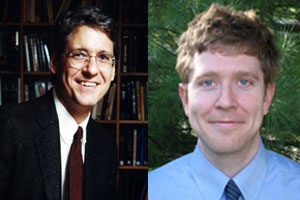
HLS Professor Jon Hanson and Adam Benforado ’05 wrote the following op-ed “Right or left, judges are activists” that appeared in the May 20 edition of the Philadelphia Inquirer. Benforado is an assistant professor of law at Drexel University’s Earle Mack School of Law and Hanson is director of The Project of Law and Mind Sciences at Harvard Law School.
The attack is on. Supreme Court Justice David Souter may still have his robe, but a conservative rabble has already begun its effort to influence who will wear it next. Their weapon is a tested one: the claim of “judicial activism.”
Over the last week, conservative pundits and bloggers have set their sights on Judge Sonia Sotomayor of the Second U.S. Circuit Court of Appeals. By most accounts, Sotomayor, who was first nominated to the federal bench by President George H.W. Bush in 1991, is an accomplished, respected jurist with a compelling personal story. Nonetheless, some on the far right have assailed her for daring to speak honestly and insightfully about the judicial process and what judging entails.
What precisely has drawn their ire? Sotomayor has challenged the popular illusion that a judge’s job is simply to apply the precedents and principles that the law provides to the facts at hand. She has publicly acknowledged what legal scholars have recognized at least since Oliver Wendell Holmes Jr.’s famous observation that “the life of the law has not been logic; it has been experience.”
As Sotomayor has explained, “personal experiences affect the facts that judges choose to see,” and true impartiality may be impossible “in all, or even in most, cases.” Her point is not that a good judge should surrender to those influences, but that to pretend they do not exist is to surrender to them.
More generally, to give unexamined weight to the experiences, worldviews, and ideologies of those who tend to occupy the bench is to favor the privileged. It is bias in the name of neutrality and a thumb on the scale in the guise of equality.
Thus, while Sotomayor has continually questioned her own “opinions, sympathies, and prejudices” in a struggle to approach objectivity, she has nonetheless wondered “whether by ignoring our differences as women or men of color we do a disservice both to the law and society.”
Sotomayor’s statements are hardly grounds for disqualification; indeed, they are supported by a century of legal scholarship that is now the stuff of many first-year law classes. All judges by necessity resort to their own moral and political values when analyzing complex factual questions and ambiguous statutory language. And all judges are susceptible to cognitive proclivities and limitations – often beyond their awareness and control.
The judicial behavior associated with “activism” is not exceptional; activism is just the term conservatives use for judges whose experiences lead them to interpret the facts, decipher the doctrine, and construe the language in ways they disagree with.
In a recent study of more than 20,000 federal court decisions, legal scholars Cass Sunstein and Thomas Miles discovered significant partisan bias (both liberal and conservative) in judicial rulings upholding or striking down the decisions of federal agencies. And, somewhat surprisingly, the conservative members of the Supreme Court demonstrated the most judicial activism, as measured by the share of agency decisions they voted to overturn.
It’s time to extinguish the misconception that the law is something that exists “out there” in its own right, and which judges merely observe and apply. Sotomayor has shown the courage to speak the truth – that the law is subject to interpretation and, “whether born from experience or inherent physiological or cultural differences, … our gender and national origins may and will make a difference in our judging.”
Being honest and acknowledging the biases we all bring to interpretive tasks is a critically important step toward fair and equal justice. For this, Sotomayor deserves our respect and admiration.
Benforado and Hanson can be contacted at adam.f.benforado@drexel.edu and hanson@law.harvard.edu.